Bulldozed by Love, in the Company of Noble Friends
Mar 15, 2013
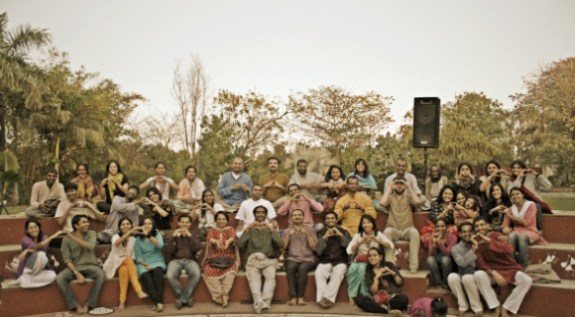
The gifts were varied and unconventional: "Two apples from my community." "A fist full of space." "Myself." "A Spanish translation of 'The Power of Now'." "A prayer that I composed." "My dearest earrings my husband gave me when we were in college." "A bow." "The first Smile Card I ever received, that I've carried with me for 4 years." "A World flag, with a story." "A minute of silence."
These were just some of the offerings made to the center of our circle. Thirty-five community organizers from around India had convened, with the simple idea of holding space. Within that space, we circled up with a heart of gift. No one could predict what would emerge, and that was precisely the point. There was no Agenda.
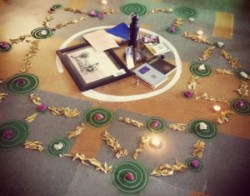 With every offering to the circle, the vibe was elevated. Yogesh spoke towards the end. "As I sat in the circle, I realized that I didn't bring anything to offer. Then I thought of my father, who had very little but always was ready to give anything around him. I realized that I have a watch on me, my father's watch, which I've worn for the last twenty years." After a pause: "I'd like to offer my watch to the circle." There was a kind of stunned silence in the air. Yogesh's watch offering lay next to Kahlil Gibran's book 'The Prophet', from which Lahar had read earlier:
With every offering to the circle, the vibe was elevated. Yogesh spoke towards the end. "As I sat in the circle, I realized that I didn't bring anything to offer. Then I thought of my father, who had very little but always was ready to give anything around him. I realized that I have a watch on me, my father's watch, which I've worn for the last twenty years." After a pause: "I'd like to offer my watch to the circle." There was a kind of stunned silence in the air. Yogesh's watch offering lay next to Kahlil Gibran's book 'The Prophet', from which Lahar had read earlier:
And there are those who have little and give it all.
These are the believers in life and the bounty of life, and their coffer is never empty.
There are those who give with joy, and that joy is their reward.
And there are those who give with pain, and that pain is their baptism.
And there are those who give and know not pain in giving, nor do they seek joy, nor give with mindfulness of virtue;
They give as in yonder valley the myrtle breathes its fragrance into space.
Though the hands of such as these God speaks, and from behind their eyes He smiles upon the earth.
It is well to give when asked, but it is better to give unasked, through understanding.
"To give unasked, through understanding" is indeed the spirit of our practice and work in the world.
Welcome to Day 1 of the 3-day "Moved By Love" retreat. Over the past five months, lots of inspired action had emerged across India -- Awakin gatherings in 22 homes, Seva Cafe in 5 cities, speaking engagements in front of tens of thousands, uncountable Smile Cards, decks and booklets, half a dozen retreats with several hundred people, new experiments from Wisdom Crafts to Giversity to Smile Cafe to Karma Theatre. Wildly awesome, but still, it's only half the story. The more important half is *how* all of this unfolded.
Leading with Inner Transformation
Leading with Inner Transformation
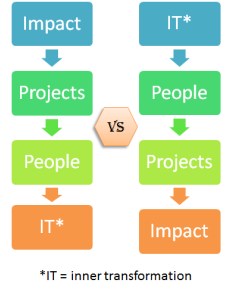 The usual process of social change involves identifying a place of suffering, figuring out a solution, finding people to implement it and hoping for a by-product of inner change. The ServiceSpace process, though, is exactly the opposite -- we start with inner transformation, that attracts people (without an agenda) and self-organizes into projects, and ultimately creates impact. What, then, is the trajectory of inner-transformation driven impact? That's the grand experiment we were all co-creating.
The usual process of social change involves identifying a place of suffering, figuring out a solution, finding people to implement it and hoping for a by-product of inner change. The ServiceSpace process, though, is exactly the opposite -- we start with inner transformation, that attracts people (without an agenda) and self-organizes into projects, and ultimately creates impact. What, then, is the trajectory of inner-transformation driven impact? That's the grand experiment we were all co-creating.
What starts as empty space quickly fills up with personal stories of transformation. Pratyush spoke about his practice of small acts, which included walking into the brothels of Delhi and tying a "rakheee" (a thread symbolizing brotherhood) to the women there and witnessing the dissolution of various judgments. In Bangalore, Monal experienced a profound kindness challenge as the first day opened, with an act of forgiveness for a woman who hit her car -- this continued for days after. Prior to starting an Awakin gathering at her home in Pune, Neeti meditated with her husband and son for 15 minutes, then 30 minutes, then an hour; after hosting circles for a few weeks, she reflected, "I used to lecture my son, but it never worked. And now the circle just holds him and says all that I would want to, and it gets through." Then she hosted a guest speaker, a principal of her school growing up. As an introduction, she went and touched his feet and said, "Sir, thank you. All those years of doing prayers in school didn't make much sense to me, but you made us do it and today, I can see how it lightens my load." In Baroda, Trupti made 75 cups of tea and offered it to random passersbys at a park (just as Siddharth did with breakfast in Mumbai's Shivaji Park). Would people ignore it? Would they accept it with grace? 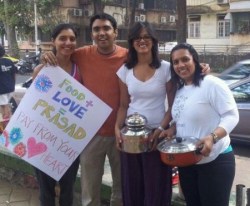 Would they be suspicious? Would they offer money to pay it forward? All of the above. At his work, Kishan started using a Smile Deck with others, doing the acts of kindness opened up entirely new avenues of regular group volunteering for all of them. When Suresh recently visited a small village, the locals wished to express gratitude for his efforts and restarted an old idea of "Raam Dukaan" (an "Honesty Shop") in the local school -- where students are trusted to pay their fair share for whatever they pick-up from the shop. Vidhu, who was very keen to come to our retreat, found a dying dog and decided to stay back to nurture him instead, and when the landlord enforced the no-pets policy, she moved out of her apartment for the sake of the dog. Nimesh, who went from music stardom to the Gandhi Ashram, practiced deepening his empathy by putting himself in another person's shoes -- like volunteering at a local blind school while being blindfolded the whole day and learning how to play cricket and going to the restroom without use of his eyes.
Would they be suspicious? Would they offer money to pay it forward? All of the above. At his work, Kishan started using a Smile Deck with others, doing the acts of kindness opened up entirely new avenues of regular group volunteering for all of them. When Suresh recently visited a small village, the locals wished to express gratitude for his efforts and restarted an old idea of "Raam Dukaan" (an "Honesty Shop") in the local school -- where students are trusted to pay their fair share for whatever they pick-up from the shop. Vidhu, who was very keen to come to our retreat, found a dying dog and decided to stay back to nurture him instead, and when the landlord enforced the no-pets policy, she moved out of her apartment for the sake of the dog. Nimesh, who went from music stardom to the Gandhi Ashram, practiced deepening his empathy by putting himself in another person's shoes -- like volunteering at a local blind school while being blindfolded the whole day and learning how to play cricket and going to the restroom without use of his eyes.
 Would they be suspicious? Would they offer money to pay it forward? All of the above. At his work, Kishan started using a Smile Deck with others, doing the acts of kindness opened up entirely new avenues of regular group volunteering for all of them. When Suresh recently visited a small village, the locals wished to express gratitude for his efforts and restarted an old idea of "Raam Dukaan" (an "Honesty Shop") in the local school -- where students are trusted to pay their fair share for whatever they pick-up from the shop. Vidhu, who was very keen to come to our retreat, found a dying dog and decided to stay back to nurture him instead, and when the landlord enforced the no-pets policy, she moved out of her apartment for the sake of the dog. Nimesh, who went from music stardom to the Gandhi Ashram, practiced deepening his empathy by putting himself in another person's shoes -- like volunteering at a local blind school while being blindfolded the whole day and learning how to play cricket and going to the restroom without use of his eyes.
Would they be suspicious? Would they offer money to pay it forward? All of the above. At his work, Kishan started using a Smile Deck with others, doing the acts of kindness opened up entirely new avenues of regular group volunteering for all of them. When Suresh recently visited a small village, the locals wished to express gratitude for his efforts and restarted an old idea of "Raam Dukaan" (an "Honesty Shop") in the local school -- where students are trusted to pay their fair share for whatever they pick-up from the shop. Vidhu, who was very keen to come to our retreat, found a dying dog and decided to stay back to nurture him instead, and when the landlord enforced the no-pets policy, she moved out of her apartment for the sake of the dog. Nimesh, who went from music stardom to the Gandhi Ashram, practiced deepening his empathy by putting himself in another person's shoes -- like volunteering at a local blind school while being blindfolded the whole day and learning how to play cricket and going to the restroom without use of his eyes.
Our entire ecosystem is built on the foundation of such practices, which ripple into a deep relationship with the context where one is planted, and ultimately into some manifest project.
When Anupreet and Susheel came to their first retreat, in Oct 2012, they weren't necessarily thinking of starting a project. Yet they connected in a high-trust context. On the flight back to Bangalore, they sat next to each other and realized that one of them runs a restaurant and the other is a great organizer, so they plotted to start Seva Cafe from the next month. Their launch was in December, and all guests their guests were moved to come back. The second one was held in January, and overflowed with 40 volunteers and a full house of 150 folks! By the end of that one, they already had 80 volunteers raring to serve the following month. 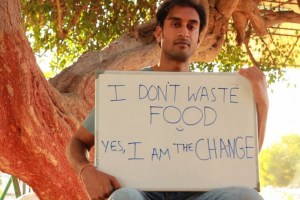 Similarly, Madhu read an email thread where Pratyush wrote about spreading some constructive messages, following the Delhi Gang Rape tragedy. He wrote back and a few emails later, a new idea had emerged -- photograph everyday people sharing their personal practice, and allow it to spread virally. "I bike to work. Yes, I am the change." "I listen to people will full attention. Yes, I am the change." "I spend time with elders everyday. Yes, I am the change." Already, more than a hundred such photos have been viewed by tens of thousands of folks, and its poised to become a viral movement.
Similarly, Madhu read an email thread where Pratyush wrote about spreading some constructive messages, following the Delhi Gang Rape tragedy. He wrote back and a few emails later, a new idea had emerged -- photograph everyday people sharing their personal practice, and allow it to spread virally. "I bike to work. Yes, I am the change." "I listen to people will full attention. Yes, I am the change." "I spend time with elders everyday. Yes, I am the change." Already, more than a hundred such photos have been viewed by tens of thousands of folks, and its poised to become a viral movement.
Cultivating Ecosystems of Trust
 Similarly, Madhu read an email thread where Pratyush wrote about spreading some constructive messages, following the Delhi Gang Rape tragedy. He wrote back and a few emails later, a new idea had emerged -- photograph everyday people sharing their personal practice, and allow it to spread virally. "I bike to work. Yes, I am the change." "I listen to people will full attention. Yes, I am the change." "I spend time with elders everyday. Yes, I am the change." Already, more than a hundred such photos have been viewed by tens of thousands of folks, and its poised to become a viral movement.
Similarly, Madhu read an email thread where Pratyush wrote about spreading some constructive messages, following the Delhi Gang Rape tragedy. He wrote back and a few emails later, a new idea had emerged -- photograph everyday people sharing their personal practice, and allow it to spread virally. "I bike to work. Yes, I am the change." "I listen to people will full attention. Yes, I am the change." "I spend time with elders everyday. Yes, I am the change." Already, more than a hundred such photos have been viewed by tens of thousands of folks, and its poised to become a viral movement.Cultivating Ecosystems of Trust
Trust is how everything starts, gathers steam, and ripples out. "The greatest crisis facing humanity today is a crisis of trust," says Jayeshbhai. Even when we try to do small acts of selfless service, people refuse it assuming that there must be strings attached. Do we have kindness gyms where we can practice giftivism? In the Internet era of always-on connections, a growing body of science is proving that we are becoming lonely and isolated. Where do we go to explore connections beyond the shallow ties of Facebook friendships? We heard from Jignasha, who is leading an urban gardening project. 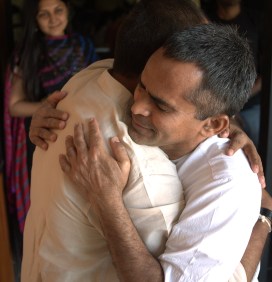 When venture capitalists wanted to invest 5 million rupees into her project, she asked if they would be willing to host a terrace garden in their homes instead; given her intent, where can she find an ecosystem to build her process and project? Is there an incubator that can cultivate ideas that stem from inner transformation?
When venture capitalists wanted to invest 5 million rupees into her project, she asked if they would be willing to host a terrace garden in their homes instead; given her intent, where can she find an ecosystem to build her process and project? Is there an incubator that can cultivate ideas that stem from inner transformation?
 When venture capitalists wanted to invest 5 million rupees into her project, she asked if they would be willing to host a terrace garden in their homes instead; given her intent, where can she find an ecosystem to build her process and project? Is there an incubator that can cultivate ideas that stem from inner transformation?
When venture capitalists wanted to invest 5 million rupees into her project, she asked if they would be willing to host a terrace garden in their homes instead; given her intent, where can she find an ecosystem to build her process and project? Is there an incubator that can cultivate ideas that stem from inner transformation?
The ServiceSpace response to this crisis is simple -- hold space. As such, the world has plenty of spaces to do plenty of things, but when ServiceSpace holds space within its three constraints of being volunteer driven, working with what you have, and thinking small, it gives birth to ecosystems that produce giftivists. Giftivists are people who are determined to practice radical acts of generosity even in the most trying situations -- like Julio Diaz, or our own Pancho Ramos. These ecosystems extended in three major spheres of influence: internal, external, and online. Or as Gandhi and Vinoba would say, "Hands, head, and heart". The internal space is defined by personal practice, which ultimately unlocks the intelligence of our heart. The external space allows projects like the gift-economy rickshaw or kitchen to engage our hands and physical communities. And the online space connects our heads to inspiring content and ideas that can shift our collective narrative.
On the evening of the first day, we had various "SpiriTED" talks from inspired folks amongst us and the next morning was dedicated to surfacing "edges".
Doing this work often forces you to tread slippery slopes. There are lots of edges to navigate. Sachi wondered if we should allow press coverage on Awakin Mumbai. It would certainly spread the word, but the quality of interest it attracts could be compromised. The Bangalore posee shared how their Seva Cafe got a lots of media coverage, but the messaging quickly lost its way when a major radio station started highlighting it as "free food"; Berkeley folks shared their conscious choice to keep Karma Kitchen focused on word of mouth; and later, when reporters approached KK (even if they came via Deepak Chopra), they were first asked to volunteer (which showed in the story). However, that approach needs support from other "word of mouse" avenues for sharing stories and generating social capital. Another coordinator spoke about the edge between serving others versus serving your own; often, it's easy to help others in need, or even others at work, but it's much harder to sustain that ethic with your own family and loved ones. Another insightful edge was in understanding how to hold a circle with minimal intervention ("do nothing", as Fukuoka would say) while being mindful that doing nothing centrally is much more work than mandating some centralized rules or banking on lazy self-organization.
Tuning Into the Heart
Even while discussing matters of the mind, our hearts were singing melodious chants in harmony. "The heart knows today what the mind will tomorrow," someone once said. Everyone had a degree of faith in that.
Neerad would wake up early and bring tea to people's bedside. Various people would secretly create works of art in our rooms. Bhuvana accidentally left some of her clothes at home, and was then anonymously tagged with so many pairs of clothes from so many people. "I'm usually not the one to cry, even at funerals, but I'm just so moved by love, by the generosity of people I don't even know," she said on the morning of the second day. Guri complimented someone on their outfit; the next day that outfit was laundered and left by her door with a note of gratitude. Anupreet felt sick for a bit, and someone put her to bed, someone brought her a blanket, someone massaged her feet. "These were all people I was meeting for the first time," she would later remark. Upon opening one's eyes after the morning meditation, you just might find a hand-written note of gratitude in front of your eyes. Or something might be at your bedside.
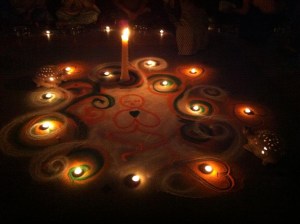 At night, we had a beautiful evening of songs, followed by a silent dinner. The powerful ambiance alone dissolved some people into tears. The volunteers serving dinner had planned to do the dishes, but everyone's cup of gratitude was overflowing so much that everyone was jostling for that honor. "I hit the lottery. I don't know what I've done to deserve being here," Meeta said with genuine gratitude, as she refused to rotate out of her dishwashing role. "Love is floating around here," was the caption of the photo Yogesh sent to his father, of people finding smiley faces as they scrubbed giant pots at the retreat center.
At night, we had a beautiful evening of songs, followed by a silent dinner. The powerful ambiance alone dissolved some people into tears. The volunteers serving dinner had planned to do the dishes, but everyone's cup of gratitude was overflowing so much that everyone was jostling for that honor. "I hit the lottery. I don't know what I've done to deserve being here," Meeta said with genuine gratitude, as she refused to rotate out of her dishwashing role. "Love is floating around here," was the caption of the photo Yogesh sent to his father, of people finding smiley faces as they scrubbed giant pots at the retreat center.
Of course, one of the most pressing queries everyone had was: "I'd love to just operate in this way, all the time. How then do I pay my bills?" In my view, that's a sincere but misplaced question. But relationship to money tends to surface a lot of sub-conscious insecurities.
On one end of the spectrum, you work a lot, save money and then dedicate yourself to service; the problem here is that you feel like you're selling your soul and then trying to buy it back, and that you might create a lot of residue along the way. The next option is to work just as much as you need and give the rest of the time; for the fortunate ones, one could learn to work just a quarter of the year and live simply the rest of the time, but the challenge with this subtle Robinhood model is that there's a gnawing sense of misalignment.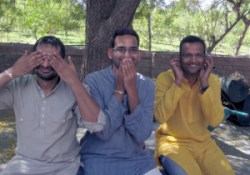 So some people will opt to work in a setting that is socially conscious, say at an NGO or social venture, so there's a deeper sense of alignment. Many times though, while the end product may be helpful to society, the process can be overwhelmingly focused on raising money, counting your good deeds, and running into systemic barriers. Therefore, some will opt for creating a new paradigm altogether, like say an incubator of generosity entrepreneurship; the flip side to that is the amount of persistence before the fruits can be harvested and burying yourself in bureaucracy. On the other far end of the spectrum, of course, you have life lived fully in trust of nature; this edge in what sounds like Utopia is that you have to cultivate unconditional acceptance of sacrifice; "things working out" here isn't a physical state per se but rather a mental state of equanimity.
So some people will opt to work in a setting that is socially conscious, say at an NGO or social venture, so there's a deeper sense of alignment. Many times though, while the end product may be helpful to society, the process can be overwhelmingly focused on raising money, counting your good deeds, and running into systemic barriers. Therefore, some will opt for creating a new paradigm altogether, like say an incubator of generosity entrepreneurship; the flip side to that is the amount of persistence before the fruits can be harvested and burying yourself in bureaucracy. On the other far end of the spectrum, of course, you have life lived fully in trust of nature; this edge in what sounds like Utopia is that you have to cultivate unconditional acceptance of sacrifice; "things working out" here isn't a physical state per se but rather a mental state of equanimity.
Everyone discussed the spectrum in small and lively groups, and found themselves resonating with the pros and cons at different parts of the spectrum.
On one end of the spectrum, you work a lot, save money and then dedicate yourself to service; the problem here is that you feel like you're selling your soul and then trying to buy it back, and that you might create a lot of residue along the way. The next option is to work just as much as you need and give the rest of the time; for the fortunate ones, one could learn to work just a quarter of the year and live simply the rest of the time, but the challenge with this subtle Robinhood model is that there's a gnawing sense of misalignment.
 So some people will opt to work in a setting that is socially conscious, say at an NGO or social venture, so there's a deeper sense of alignment. Many times though, while the end product may be helpful to society, the process can be overwhelmingly focused on raising money, counting your good deeds, and running into systemic barriers. Therefore, some will opt for creating a new paradigm altogether, like say an incubator of generosity entrepreneurship; the flip side to that is the amount of persistence before the fruits can be harvested and burying yourself in bureaucracy. On the other far end of the spectrum, of course, you have life lived fully in trust of nature; this edge in what sounds like Utopia is that you have to cultivate unconditional acceptance of sacrifice; "things working out" here isn't a physical state per se but rather a mental state of equanimity.
So some people will opt to work in a setting that is socially conscious, say at an NGO or social venture, so there's a deeper sense of alignment. Many times though, while the end product may be helpful to society, the process can be overwhelmingly focused on raising money, counting your good deeds, and running into systemic barriers. Therefore, some will opt for creating a new paradigm altogether, like say an incubator of generosity entrepreneurship; the flip side to that is the amount of persistence before the fruits can be harvested and burying yourself in bureaucracy. On the other far end of the spectrum, of course, you have life lived fully in trust of nature; this edge in what sounds like Utopia is that you have to cultivate unconditional acceptance of sacrifice; "things working out" here isn't a physical state per se but rather a mental state of equanimity. Everyone discussed the spectrum in small and lively groups, and found themselves resonating with the pros and cons at different parts of the spectrum.
Lots of new ideas emerged, lots of practices were inspired, lots of friendships were sealed in service.
Synergizing Beyond Words
Synergizing Beyond Words
By the third day, the synergy, the ambiance, the vibration of compassion was at its peak. It was almost as if the purpose of all our individual journeys, including our past three days, was simply to co-create this ambiance. In the vast matrix of our interconnected-ness, it would help somebody, somewhere somehow. That felt enough for all of us.
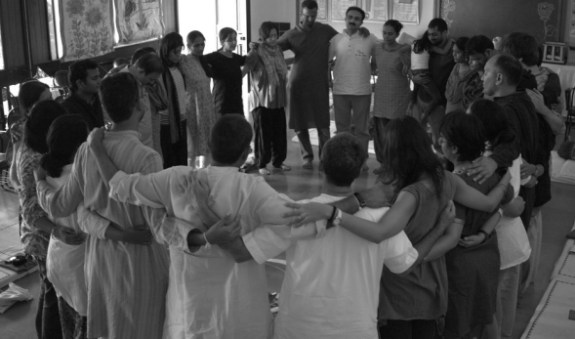
In our closing circle, people spontaneously made some commitments, in the spirit of paying forward what they'd received. One woman admitted, "I've never listened to others. Really, just ask any of my friends. Now, I take a vow to value what others are saying." Another said that in all the strategizing for external and online spaces, he forgot about the power of inner spaces -- and took on a 30 day kindness challenge. Another person decided to meditate 2 hours everyday. I myself expressed my gratitude for all that people offered, and particularly the courage and spirit they exemplified; I then thanked Yogesh-bhai for offering his father's watch in the circle, and with a shaking hand, I gave him a cherished watch that was once gifted to me -- that of the legendary Gandhian Ishwar Patel. They say that what goes around comes around, but they forget to add how we feel when it actually does come around. :)
Gratitude, and many tears of gratitude, undeniably filled our shared space.
We concluded with a practice of three-steps-and-a-bow, with a spirit of renunciation for outcomes of our action, gratitude for long lineages of causes that manifested this moment, and humility in surrendering to all that may occur. Joserra shared some eloquent words that echoed the collective: "May this gratefulness walk with me on my way. May I be a gift to all of you."
Gratitude, and many tears of gratitude, undeniably filled our shared space.
We concluded with a practice of three-steps-and-a-bow, with a spirit of renunciation for outcomes of our action, gratitude for long lineages of causes that manifested this moment, and humility in surrendering to all that may occur. Joserra shared some eloquent words that echoed the collective: "May this gratefulness walk with me on my way. May I be a gift to all of you."
Indeed that's how we all felt.
One amongst us quipped, "Moved by love. Actually more like bulldozed by love." The kind of love that knows no boundaries, and is always bursting to be paid forward.
One amongst us quipped, "Moved by love. Actually more like bulldozed by love." The kind of love that knows no boundaries, and is always bursting to be paid forward.

